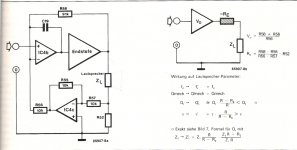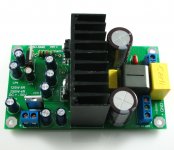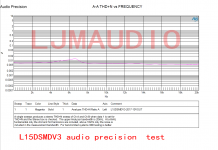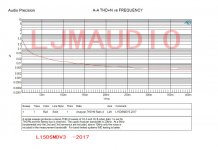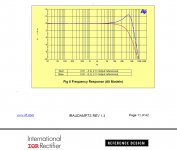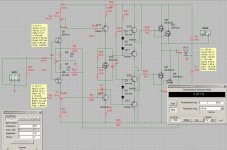Greetings.
This seems to be the right thread for my questions.
I have used an active satellite + subwoofer system with 5 amp modules (ILP) for years, but they seem to have deteriorated (they produce measureable xover distortion).
I think of upgrading them with L15D modules. Those seem a contemporary standard and avoid some problems with the old system I had.
Q1: I only need a fraction of the power they are able to produce, say 60W for the midrange and maybe 10W for the treble, maybe 60 for the subwoofer. Probably never needed more than a fraction of that. Are there any adverse effects to be expected by running them on a lower supply, say 30-0-30 transformers? But then I would join them all on one 300VA transformer. I know that for heavy use this would be underrated. But with nearly 300 Watts my room, let alone speakers would probably fall apart.
Q2: The active filters go back to a ´86 Elektor design (Elektor Plus3, 1986, p.111ff) which uses an active feedback (actually a feedforward) design on the subwoofer for eliminating some of the coil resistance in order to get tighter control over the speaker excursion. Could that be any problem with the L15D modules?
Thank you very much,
-helmut
This seems to be the right thread for my questions.
I have used an active satellite + subwoofer system with 5 amp modules (ILP) for years, but they seem to have deteriorated (they produce measureable xover distortion).
I think of upgrading them with L15D modules. Those seem a contemporary standard and avoid some problems with the old system I had.
Q1: I only need a fraction of the power they are able to produce, say 60W for the midrange and maybe 10W for the treble, maybe 60 for the subwoofer. Probably never needed more than a fraction of that. Are there any adverse effects to be expected by running them on a lower supply, say 30-0-30 transformers? But then I would join them all on one 300VA transformer. I know that for heavy use this would be underrated. But with nearly 300 Watts my room, let alone speakers would probably fall apart.
Q2: The active filters go back to a ´86 Elektor design (Elektor Plus3, 1986, p.111ff) which uses an active feedback (actually a feedforward) design on the subwoofer for eliminating some of the coil resistance in order to get tighter control over the speaker excursion. Could that be any problem with the L15D modules?
Thank you very much,
-helmut
Attachments
(can no longer edit my previous message...)
I forgot. The original IRAUDAMP7Sdesigns speaks of "scalable". Does this apply to your design too? Meaning, running it with a lower voltage.Is there at all any sense in having modules that can output endless power if I don´t need it, or is there some reason for toning them down?
If this all leads to the conclusion that I need some bigger transformer I might decide to forget about a 600VA copper monster and go for a SMPS.
-helmut
I forgot. The original IRAUDAMP7Sdesigns speaks of "scalable". Does this apply to your design too? Meaning, running it with a lower voltage.Is there at all any sense in having modules that can output endless power if I don´t need it, or is there some reason for toning them down?
If this all leads to the conclusion that I need some bigger transformer I might decide to forget about a 600VA copper monster and go for a SMPS.
-helmut
L15D-POWER AP SYS TWO TEST:
After the revised version.
Attachments
After the revised version.
What is the difference?
What is the difference?
From the sound. Performance.
They are almost no difference.
But the new version is not degrade performance.
Just for the convenience of my production.
Frequency response.
Because I use 8 ohm load, so 20 k up, because the inductance, the influence of the capacitor.
If you use a 4 ohm load, downward attenuation.
Because the speaker is inductance in actual use. Will not affect.
Because I use 8 ohm load, so 20 k up, because the inductance, the influence of the capacitor.
If you use a 4 ohm load, downward attenuation.
Because the speaker is inductance in actual use. Will not affect.
Attachments
Any supplier recommendation?
Who sell this version?
This one ?
L15DSMD 250W IRS2092S Class D Mono Amplifier completed board LJM | eBay
Hi.
[reading more about the questionable benefits of this practise I dropped it...}
A new problem has arisen.
The modules are working well, but when I have some signal on the input and no load on the output, then R30 (10Ohm 1W zobel resistor) starts to produce signs of smoke. There must be a hell of RF energy going into it.
This resistor is darn close to the power filter electrolytic.
Although this is no problem during regular use, there may be a problem when one of the dc protection modules cuts the load off. During start-up this happens regularly, but only for one or two seconds. Also, a cable might become faulty or somebody might unplug the speaker. There is no guarantee the load is there.
Has anybody observed this or knows alleviation to it?
I suppose that´s what R31, the 2k2 shunt for the load is there, but it seems not to work.
China does not respond to a request.
Thanks,
-helmut
[reading more about the questionable benefits of this practise I dropped it...}
A new problem has arisen.
The modules are working well, but when I have some signal on the input and no load on the output, then R30 (10Ohm 1W zobel resistor) starts to produce signs of smoke. There must be a hell of RF energy going into it.
This resistor is darn close to the power filter electrolytic.
Although this is no problem during regular use, there may be a problem when one of the dc protection modules cuts the load off. During start-up this happens regularly, but only for one or two seconds. Also, a cable might become faulty or somebody might unplug the speaker. There is no guarantee the load is there.
Has anybody observed this or knows alleviation to it?
I suppose that´s what R31, the 2k2 shunt for the load is there, but it seems not to work.
China does not respond to a request.
Thanks,
-helmut
Does L7 amp need a separate preamlifier together with the pcie sound card in PC?
NE5532 Preamp Pre-Amplifier Board Musical Fidelity A1 Circuit Amplifier Audio | eBay
I have this board and is it necessary for the L7 amp?
NE5532 Preamp Pre-Amplifier Board Musical Fidelity A1 Circuit Amplifier Audio | eBay
I have this board and is it necessary for the L7 amp?
Hi.
[reading more about the questionable benefits of this practise I dropped it...}
A new problem has arisen.
The modules are working well, but when I have some signal on the input and no load on the output, then R30 (10Ohm 1W zobel resistor) starts to produce signs of smoke. There must be a hell of RF energy going into it.
This resistor is darn close to the power filter electrolytic.
Although this is no problem during regular use, there may be a problem when one of the dc protection modules cuts the load off. During start-up this happens regularly, but only for one or two seconds. Also, a cable might become faulty or somebody might unplug the speaker. There is no guarantee the load is there.
Has anybody observed this or knows alleviation to it?
I suppose that´s what R31, the 2k2 shunt for the load is there, but it seems not to work.
China does not respond to a request.
Thanks,
-helmut
Hi Helmut .
It's not advisable to run IRS2092 class D amp's without load !! it's well documented , the output filter may resonate at very high voltages . Nigel Wright made quite a view comment on this and if you carefully read the documentation of many commercial multi channel Class D amplifiers , they recommend to terminate the non used channels with a 8 ohm 5 watt resistor . It might also be the reason that your DC protection modules are cutting out on start up . Try a resistor on the output and see if it happens again . Your Zobel network components should not be blown by a 2 second delay of the DC protection . If it does , beef up the components !
Cheers ,
Rens
Rens,
thanks for your reply. I do not know which thread you are referring to and I cannot find it. If you have a link at hand that would be most welcome.
I never read anybody else´s manual because I quickly decided for the L15D.
But that´s good to know.
There is always a nervous tickle when you first time power the thing up with a real supply and not a bench supply.
But everything worked fine, even without load. But then it turns out having an input signal on the amp without load makes the Zobel resistor fry.
The one supplied is a 2W, which is an improvement over the 1W listed in the original article. It got so hot it smoked.
Point is, you cannot guarantee that somebody in the family would haphazardly unplug a speaker or a dc protection module fails on startup to connect to the load.
Since this thread seemed a bit deserted, I tried over in another one here.
A kind forum member told me to beef up the Zobel resistor as you said, and/or to add a second, amended Zobel network.
Tomorrow the pieces should arrive and I will know more.
I had thought about a resistive dummy load, but this would probably fry if there was an input present and the amp pumping current into it.
And leaving one there permanently under load would certainly fry it.
Did you mean on the speaker relay? For the two seconds that the speakers are delayed?
This does not annoy me, rather the situation described above.
If the Zobel trick does not work, maybe a somewhat higher dummy resistor, say 100 Ohms or so might work. Not elegant.
thanks,
-helmut
thanks for your reply. I do not know which thread you are referring to and I cannot find it. If you have a link at hand that would be most welcome.
I never read anybody else´s manual because I quickly decided for the L15D.
But that´s good to know.
There is always a nervous tickle when you first time power the thing up with a real supply and not a bench supply.
But everything worked fine, even without load. But then it turns out having an input signal on the amp without load makes the Zobel resistor fry.
The one supplied is a 2W, which is an improvement over the 1W listed in the original article. It got so hot it smoked.
Point is, you cannot guarantee that somebody in the family would haphazardly unplug a speaker or a dc protection module fails on startup to connect to the load.
Since this thread seemed a bit deserted, I tried over in another one here.
A kind forum member told me to beef up the Zobel resistor as you said, and/or to add a second, amended Zobel network.
Tomorrow the pieces should arrive and I will know more.
I had thought about a resistive dummy load, but this would probably fry if there was an input present and the amp pumping current into it.
And leaving one there permanently under load would certainly fry it.
Did you mean on the speaker relay? For the two seconds that the speakers are delayed?
This does not annoy me, rather the situation described above.
If the Zobel trick does not work, maybe a somewhat higher dummy resistor, say 100 Ohms or so might work. Not elegant.
thanks,
-helmut
Very nice.
The true limit of the usual L7 is that it blows the drivers going beyond a +/-30 V transformer.
Could this turbo version overcome the problem and give more power output?
Very nice.
The true limit of the usual L7 is that it blows the drivers going beyond a +/-30 V transformer.
Could this turbo version overcome the problem and give more power output?
Maybe not, as there are 2n5551/5401 in Q15-Q13?
- Home
- Vendor's Bazaar
- LJM Audio
